The Future is Open: OGP at UNGA
Last month, the Open Government Partnership and the Ford Foundation convened more than 60 global open government leaders from government, civil society, and international organizations for an OGP Leaders Roundtable on the sidelines of the 79th General Assembly of the United Nations (UNGA).
Moderated by OGP Ambassador and former Prime Minister of New Zealand Helen Clark, this high-level roundtable served as a platform for governments and civil society to share their experiences and reaffirm their commitmentOGP commitments are promises for reform co-created by governments and civil society and submitted as part of an action plan. Commitments typically include a description of the problem, concrete action... to open government reforms as a critical means to strengthening democracies and building trust with citizens.
OGP’s CEO Sanjay Pradhan noted that in an era of democratic transition, mounting polarization, and disruptive technology, the role of open government is more vital than ever.
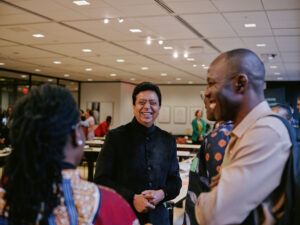
The discussions were anchored by the ambitious commitments outlined in the Open Gov Challenge, particularly on anti-corruption, digital governanceAs evolving technologies present new opportunities for governments and citizens to advance openness and accountability, OGP participating governments are working to create policies that deal with the ... More, public participationGiving citizens opportunities to provide input into government decision-making leads to more effective governance, improved public service delivery, and more equitable outcomes. Technical specificatio..., and the promotion of civic space, as well as global action that can be taken. Leaders in attendance emphasized the critical role of cross-sector collaboration in addressing contemporary challenges like misinformation, corruption, and the protection of civil liberties.
One of the morning’s first discussions focused on citizen participationAccording to OGP’s Articles of Governance, citizen participation occurs when “governments seek to mobilize citizens to engage in public debate, provide input, and make contributions that lead to m... More. Accountability Lab’s Co-CEO and outgoing Co-Chair of the OGP Steering CommitteeThe Steering Committee is OGP’s executive decision-making body. Its role is to develop, promote and safeguard OGP’s values, principles and interests; establish OGP’s core ideas, policies, and ru..., Blair Glencorse, emphasized the importance of citizen engagement, noting that “if we are to renew democracy and build the future we want, public participation is going to be central to the way we make decisions, and there has to be civic space for it to happen meaningfully.”
As technology continues to redefine governance, democratizing digital tools has emerged as a key priority for many OGP members. Korir Song’ei, Principal Secretary of Foreign Affairs in the Ministry of Foreign and Diaspora Affairs of Kenya, and Natalia Carfi, Executive Director of Open DataBy opening up data and making it sharable and reusable, governments can enable informed debate, better decision making, and the development of innovative new services. Technical specifications: Polici... Charter, discussed the increasing role of technology in governance, stressing the need for transparencyAccording to OGP’s Articles of Governance, transparency occurs when “government-held information (including on activities and decisions) is open, comprehensive, timely, freely available to the pub... More in how digital tools and algorithms are used in public services.
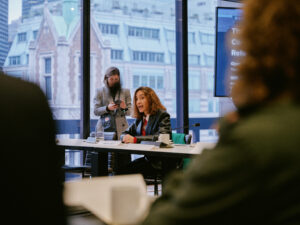
Against a backdrop of political polarization and closing civic space, open government reforms can play a critical role in reinforcing democratic institutions by ensuring their integrity and accountability and to protect the enabling environment for citizens to organize and express their opinions and needs. Vinicius Marques de Carvalho, Minister of the Office of the Comptroller General, Federative Republic of Brazil shared the country’s open government strategy which includes long-term actions to increase civic space. “By increasing openness, transparency, and access to information, we encourage greater participation which itself reinforced the protection of civic space and ultimately, safeguard democracy,” said Minister Marques de Carvalho.
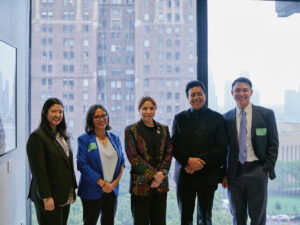
Meanwhile, the Executive Director of the Extractive IndustriesApplying open government values of transparency, participation, and accountability to extractive industries can decrease corruption, safeguard community interests and needs, and support environmental ... Transparency Initiative Mark Robinson and Amenah Pangandaman, Secretary of the Department of Budget and Management of the Philippines. highlighted how open government reforms have supported their efforts to fight corruption and create more accountable governments through transparency in contracting and extractives, beneficial ownershipDisclosing beneficial owners — those who ultimately control or profit from a business — is essential for combating corruption, stemming illicit financial flows, and fighting tax evasion. Technical... More, and political integrity. “We are determined to continue to pursue these anti-corruption reforms using a whole of government and whole of nation approach to ultimately achieve inclusive, sustainable transformation in fulfillment of our agenda for prosperity” said Secretary Pangandaman.
Attendees from multilateral and international civil society organizations and funders highlighted their strategies to promote open government across the world. Leaders from the Carter Center, European Commission, International IDEA, and the United Kingdom’s Foreign, Commonwealth & Development Office shared initiatives to integrate open government principles into development cooperation and global governance frameworks.
The event also presented an opportunity for the Maldives and Zambia to announce their intention to join the Partnership.
Lastly, it also marked the transition of leadership for the OGP Steering Committee from the Government of Kenya and Blair Glencorse to new co-chairsThe leadership of the Steering Committee is made up of four co-chairs who provide strategic guidance and support to advance OGP’s overarching priorities. Co-Chairs serve two-year terms beginning on ..., the Government of Spain and Cielo Magno from Batay Kita-Publish What You Pay Philippines, who will lead the Partnership for the next year. It was also announced that the Government of Brazil and Steph Muchai from Kenya have been selected to serve as our next government and civil society co-chairs, starting in October 2025.
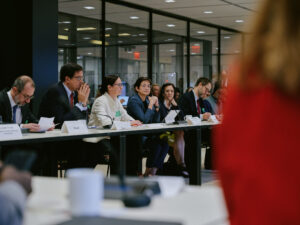
As Co-Chairs, Spain, and Doctor Magno will focus on rebuilding citizen trust in government institutions and leveraging the power of three axis points, ‘people, institutions, and technology’. “In our [agenda], we will emphasize citizen-centric decision-making, resilient democracies, and protecting rights. […] I’m sure that we can become a great coalition of nations through open government. Let me finish by extending an invitation to the 9th OGP Global Summit in October 2025 the beautiful city of Vitoria-Gasteiz” said Oscar Lopez Agueda, Minister for Digital TransformationGovernments are working to increase access to and quality of government services, improve transparency, and create opportunities for participation by using information and communications technologies.... More of Spain.
The momentum from this roundtable will carry into upcoming OGP regional events in Brazil, the Philippines, and Kenya, where the conversation will deepen around the regional aspects of the themes discussed today. These events will further explore the ways in which open government reforms can meet the global challenges of our time and deliver real impact for citizens.
As the world faces growing uncertainties, this gathering in New York highlighted a powerful truth: the future of open government rests on our ability to work together—across sectors, across borders, and with citizens at the heart of the effort.

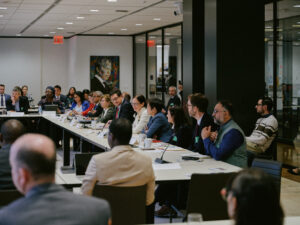
Gladys Estela Riveros Rojas Reply
El futuro del gobierno abierto depende de nuestra capacidad de trabajar juntos, en todos los sectores, a través de las fronteras y con los ciudadanos en el centro del esfuerzo.
Es importante porque, si se conoce se quiere, y valoramos lo que tenemos para mejorar.
Con transparencia en su entorno (interior y exterior).